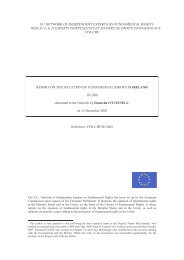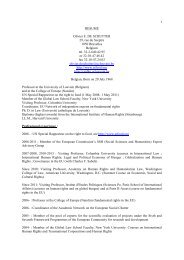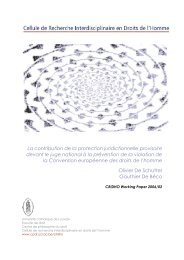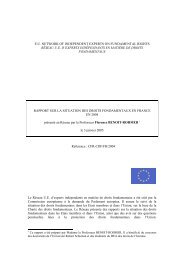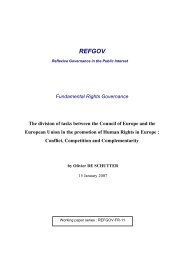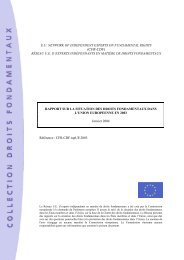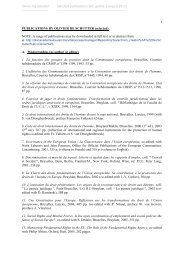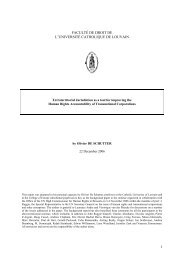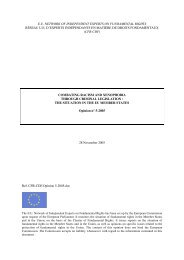The Prohibition of Discrimination under European Human ... - cridho
The Prohibition of Discrimination under European Human ... - cridho
The Prohibition of Discrimination under European Human ... - cridho
You also want an ePaper? Increase the reach of your titles
YUMPU automatically turns print PDFs into web optimized ePapers that Google loves.
thematic report<br />
■ THE PROHIBITION OF DISCRIMINATION UNDER EUROPEAN HUMAN RIGHTS LAW ■<br />
employment, is not strictly tailored to the needs <strong>of</strong> the task to be performed. 115 <strong>The</strong> requirements <strong>of</strong> the <strong>European</strong><br />
Convention on <strong>Human</strong> Rights in this respect should be taken into account, in particular, when an interpretation is<br />
required <strong>of</strong> the prohibition <strong>of</strong> indirect discrimination, as defined in Article 2(2)(b) <strong>of</strong> the Framework Directive, as<br />
well as <strong>of</strong> the safeguard clauses contained in Article 7(2) <strong>of</strong> the Framework Directive, which states that<br />
with regard to disabled persons, the principle <strong>of</strong> equal treatment shall be without prejudice to the right <strong>of</strong><br />
Member States to maintain or adopt provisions on the protection <strong>of</strong> health and safety at work or to measures<br />
aimed at creating or maintaining provisions or facilities for safeguarding or promoting their integration into<br />
the working environment.<br />
As well as in Article 2(5) <strong>of</strong> the Framework Directive, which authorizes the Member States to adopt measures «<br />
which, in a democratic society, are necessary for public security, for the maintenance <strong>of</strong> public order and the<br />
prevention <strong>of</strong> criminal <strong>of</strong>fences, for the protection <strong>of</strong> health and for the protection <strong>of</strong> the rights and freedoms <strong>of</strong><br />
others ». Existing or future118 health and safety regulations should be immunized, <strong>under</strong> these clauses, from being<br />
challenged as in violation <strong>of</strong> the non-discrimination requirements <strong>of</strong> the Directive, and as having therefore to be<br />
abolished, 117 only if they comply with the requirements <strong>of</strong> Article 8 ECHR as interpreted by the <strong>European</strong> Court <strong>of</strong><br />
<strong>Human</strong> Rights.<br />
A second question <strong>of</strong> interpretation <strong>of</strong> these provisions concerns the obligation imposed on employers to provide<br />
effective accommodation in order to ensure that workers with disabilities may be recruited or retained, unless this<br />
imposes a « disproportionate burden » on the employers concerned. It will suffice to say in the context <strong>of</strong> this<br />
report that the right to peaceful enjoyment <strong>of</strong> possessions guaranteed <strong>under</strong> Article 1 <strong>of</strong> Protocol n°1 to the ECHR<br />
does not constitute an obstacle to the imposition <strong>of</strong> such an obligation on the employer, especially when<br />
combined with the proviso that it should not lead to imposing a disproportionate burden.<br />
In the absence <strong>of</strong> a case-law <strong>of</strong> the monitoring bodies <strong>of</strong> the Convention relating specifically to this issue, the case<br />
<strong>of</strong> Mellacher and Others v. Austria should be considered as guiding.<strong>The</strong> applicants, landlords in Austria, complained<br />
<strong>of</strong> an infringement <strong>of</strong> their property rights <strong>under</strong> Article 1 <strong>of</strong> Protocol No. 1 to the Convention by reason <strong>of</strong> the<br />
allegedly excessive reduction in rents allowed to their tenants <strong>under</strong> the 1981 Rent Act which restricted<br />
agreements on the basic rent for premises covered to the amount regarded as reasonable with reference to the<br />
size, type, layout, location, fittings and condition <strong>of</strong> the premises and laid down maximum limits for the most<br />
common types <strong>of</strong> apartments. <strong>The</strong> Court rejected the argument <strong>of</strong> the applicants that the infringement with their<br />
property rights was disproportionate, observing in particular that « in remedial social legislation and in particular<br />
in the field <strong>of</strong> rent control (…) it must be open to the legislature to take measures affecting the further execution<br />
115<br />
<strong>The</strong> recent case-law <strong>of</strong> the <strong>European</strong> Court <strong>of</strong> <strong>Human</strong> Rights on this issue shows, however, that the States parties to the ECHR are recognized a<br />
certain margin <strong>of</strong> appreciation in this regard : see Eur. Ct. HR (1st sect.), dec. <strong>of</strong> 7 November 2002, Madsen v. Denmark, Appl. n° 58341/00<br />
(inadmissibility <strong>of</strong> manifestly ill-founded application allegingin a violation <strong>of</strong> Article 8 ECHR by the crewmember <strong>of</strong> a Danish shipping<br />
company subjected to mandatory alcohol and drug tests justified by safety reasons); and Eur. Ct. HR (4th sect.), dec. <strong>of</strong> 9 March 2004, Wretlund<br />
v. Sweden, Appl. n° 46210/99 (inadmissibility <strong>of</strong> the application lodged by an <strong>of</strong>fice cleaner at a nuclear plant obliged to comply with a drug<br />
testing aimed at detecting the presence <strong>of</strong> cannabis).<br />
116<br />
Despite the fact that the Framework Directive, while authorizing the member States to introduce or maintain measures more favourable to<br />
the realization the principle <strong>of</strong> equal treatment – as it lays down minimum requirements for combating discrimination, based inter alia on<br />
disability, as regards employment and occupation –, specifically states that the implementation <strong>of</strong> the Directive « should not serve to justify<br />
any regression in relation to the situation which already prevails in each Member State » (Preamble, Recital 28), it is clear from both Article 7(2)<br />
and Article 2(5) <strong>of</strong> the Directive that the Member States may introduce further requirements aiming at the protection <strong>of</strong> health and safety at<br />
work even though such measures may impact negatively upon the access to employment <strong>of</strong> persons with disabilities.<br />
117<br />
Art. 16 <strong>of</strong> the Framework Directive.<br />
42



